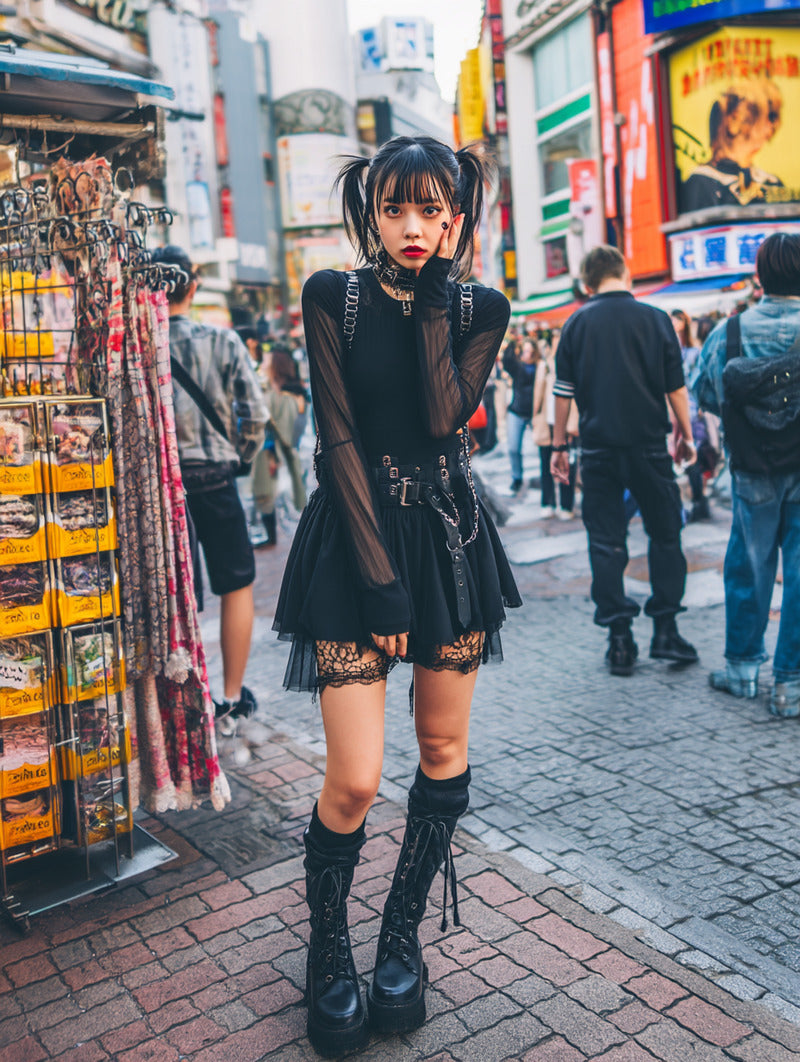
Japanese Street Style Fashion: Fashion Is A Street Culture Game
Japanese street style fashion is more than just a way of dressing. It is a form of contemporary art – where each outfit is a statement of personality, reflecting the cultural depth, creativity and social psychology of Japanese youth.
A Brief History of Japanese Street Style: From Harajuku to Global Style
When it comes to Japanese street fashion , no one can ignore Harajuku – a famous neighborhood in Tokyo, where fashion has no limits and style has no borders. Since the 1990s, Harajuku has been the cradle of a series of “visual revolution” trends: from Gothic Lolita, Decora, Gyaru to Visual Kei. Each style is not just aesthetic – but a whole community, a spirit of life.
What’s special about Japanese street fashion is that it’s unpredictable. It’s not bound by global trends, it doesn’t conform to Western norms, but rather develops as a parallel stream – sometimes moving forward, sometimes backward, but always free and with a strong personality.

Mainstreams of Japanese Street Style Fashion
1. Harajuku Style – Unlimited Fashion Stage
Harajuku style is characterized by colorful diversity, dense layering, bold patterns and a strong DIY spirit. Each outfit is a “free-form work” where the wearer often makes their own accessories, cuts – sews – destroys – transforms clothes in a unique way.
2. Soft Girl Meets Traditional – When Japanese Gen Z Feminizes Traditional Dress
Recently, young Japanese women combine yukata, hakama or kimono-inspired items with T-shirts, sneakers and tote bags. The fusion of tradition and modernity creates a unique image: gentle, graceful but still full of street style.
3. Techwear and Minimalism – “Street” in a Cold Way
In a completely opposite branch, Japanese street fashion women also have a minimalist direction with the main colors of black - gray - white. This style is often inspired by techwear, cyberpunk or functional design - where every detail has a function. All combined to create a calm, mysterious, cold but not boring aesthetic.

Why Does Japanese Street Fashion Make the Whole World Fascinated?
Unlike styles influenced by runway or celebrity culture, Japanese street style fashion comes from the wearer himself. It reflects the inner world – whether it is a gentle rebellion against the normative society, or simply the desire to “exist in your own way”.
Interestingly, in Japan, dressing “differently” does not mean being rebellious. On the contrary, it is a subtle way of expressing oneself. Each person can “live two lives”: one serious life at work, one rebellious life on the streets. And fashion is a tool to transform between those two worlds.

How Does This Style Affect Vietnamese Gen Z?
In Vietnam, Gen Z is gradually approaching and internalizing Japanese street fashion in their own way. No longer cosplaying Harajuku or copying Japanese lookbooks, Vietnamese youth are looking for simple items - but with a "different enough" vibe such as layered mesh skirts, color-blocked parachute jackets, large hair accessories or hand-painted canvas bags.
What Gen Z learns from Japan is not to “dress alike” but to think of mixing and matching clothes as art . Fashion does not have to be expensive, but it must have depth – and dare to be different.

Conclude
Japanese street style fashion doesn’t force you to be like anyone else. It encourages you to find your own aesthetic voice, to express your inner self in a creative, civilized and artistic way. It’s no longer just a Tokyo thing – it’s a living lesson for all young fashion lovers around the world.
Related articles:
Men's and Women's Sportswear 2025 - The Bridge Between Dressing Style and Active Lifestyle
Where Do Natural Fibers Come From? Why Are They Increasingly Popular?
Floral Patterns – When Emotions Bloom on Soft Fabrics
Fabric Handbags – When Accessories Become a Statement of Stylish Lifestyle
Is Polyester Fabric Cool? Facts You Need to Know Before Buying Summer Clothes

